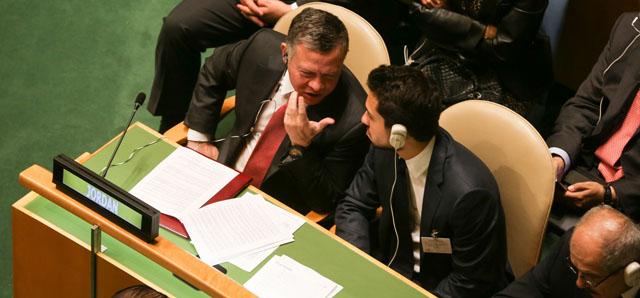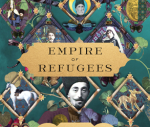You are here
King outlines Jordan’s future vision at Clinton Global Initiative
By JT - Sep 24,2014 - Last updated at Sep 24,2014

AMMAN — His Majesty King Abdullah on Tuesday took part in the Clinton Global Initiative (CGI) opening panel discussions, which focused on challenges facing countries to create better opportunities for the youth especially in the Middle East.
During the 10th annual meeting of the New York-based foundation, former US president Bill Clinton announced “commitments” by firms to help Jordan overcome challenges posed by regional crisis and an economic crisis.
They include Bluedrop Performance Learning, Vestas Wind Systems, Medtronic, Americare, International Medical Corps, PilosioSpA and Global Impact.
At the panel, which also included Chile President Michelle Bachelet and moderated by Clinton, the discussions also focused on economic issues, women empowerment and terrorism.
King Abdullah said that despite the gloomy picture of the situation in the Middle East, “the good news, and the big challenge at the same time is that 60 per cent of the population is under 30”.
“For a small country like Jordan, this is a positive thing,” added the King, highlighting that the Kingdom has a young population that is highly educated, tech savvy and has been “very resilient”, considering the history of Jordan.
“I mean if you look at the history of Jordan over the many decades, it has survived all the shocks the region has produced,” His Majesty said.
“Everyone is telling us we are shocked that Jordan is still doing what it is doing and suffering what it is suffering, and still keeping its head above the water, and I think this has been the secret of Jordan, which is part due to the relationship between the public sector and private sector.”
“We have also invested in our youth and there are many programmes going on between the public and private sectors and a lot of investments coming to Jordan but on the other side of the story, there is the burden of refugees,” noted the Monarch.
On the refugee crisis, the King said that “Jordan has been a country that always welcomes refugees because it is the right thing to do,” adding that while hosting refugees poses a “tremendous” economic burden, the economy is also coming back.
King Abdullah cited last year’s situation in which most of the aid that came from donor countries and organisations only accounted for 39 per cent of the assistance the Kingdom needed, which has been a burden on the Jordanian economy.
This year, the King added, the burden of refugees is expected to reach $4 billion, while Jordan received only 40 per cent of the anticipated aid so far.
The King wondered how Jordan is expected to balance the burden of Syrian refugees, while the national economy is recovering.
His Majesty said that the same issue is facing the world today, as all countries are suffering, to give a hope and promise to the youths, especially to those in the Middle East, who feel abandoned.
He added that it is time for a comprehensive fight between the good and the evil to give the young generations a promise that “we all care about their future”, citing the opportunity the Islamic State terror group is seizing by providing a fighter $1,000 a month, which is the salary of a high-middle class individual in Jordan.
“If we don’t stand to our moral responsibility, how can we fight extremism?” asked the King, stressing that fighting IS is no longer the duty of those in the Middle East as the fighters they recruit are coming from all around the world.
He highlighted that the pressure on Jordan to be able to stand politically and militarily is very high because the Syrians and Iraqis have entrusted the Kingdom to stand by them.
“But we are asking the international community to have our back, because we cannot do it without their help,” he said.
On the other hand, he cited $10 billion in programmes that are being launched in Jordan, noting that the Kingdom’s investment in renewable energy has been a “benchmark” to the country for over the past 10 years, while it has become the main hub of ICT business in the Middle East, and so has been the healthcare, medicine and high-tech vocational training.
Regarding women’s empowerment, the King indicated that there are still challenges in this area, posed partly by social norms.
He highlighted that in the results of the high school annual testing, girls always score higher than the boys and the same applies at the universities, “but we start losing them the minute they go in the workplace”.
He added that the small and medium enterprises have been “very successful” in giving women, especially in rural areas, the power and ability to provide for their families.
Meanwhile, the King highlighted efforts exerted by Jordan to fight extremism, citing last year’s conference held in the Kingdom to bring together Sunni and Shiite clerics to say that what was happening in Syria has nothing to do with Islam.
Two weeks later, the King added, another conference was held in Jordan, but this time to gather Christian and Muslim leaders to denounce extremism.
The Monarch noted that extremist groups have used regional conflicts, especially the Arab-Israeli struggle and perceived injustices, to recruit new elements.
“All roads lead to Jerusalem,” he said.
The King underlined that extremists use the injustice of Palestinian and Jerusalem to pass their propaganda, and unless Palestinians and Israelis are brought together at the same table to negotiate and find solutions, things will only get worse.
Regarding Iraq, the King said Jordan wants to see Sunnis go back to their country and feeling that they have a future there.
In addition, the King said the challenge now is also to combat ignorance, because extremists “come and say they do what they do in the name of Islam but they have nothing to do with Islam whatsoever”.
“At the same time we want our Western friends to fight Islamophobia,” said the King.
For his part, Clinton acknowledged the huge impact of the crisis in Syria on the Jordanian infrastructure and economy and called for greater international assistance to support Jordan in its efforts to host Syrian refugees.
He referred to Jordan as a country that “stands for the right thing” and commended the “extraordinary leadership” of King Abdullah and the Jordanian government during such arduous times, noting that the country has welcomed those in need in spite of its own internal political challenges.
Clinton stressed the need for the international community to do more to help the Kingdom fulfil its pivotal role and called on world powers to assist by devising alternative energy, sanitation, economic expansion and education programmes for Jordan, thanking those involved in the CGI for their efforts so far. He noted that the world “owes a huge debt” to the Kingdom for the burdens it has assumed by hosting Syrian refugees.
Related Articles
Their Majesties King Abdullah and Queen Rania returned home on Thursday after a working visit to Paris and New York, a Royal Court statement said.
AMMAN — Her Majesty Queen Rania underscored the need for coordinated global action in helping the world’s expanding refugee population integ
AMMAN — His Majesty King Abdullah focused on the Syrian refugee crisis and Israeli violations in Jerusalem during a series of meetings held




















